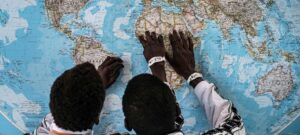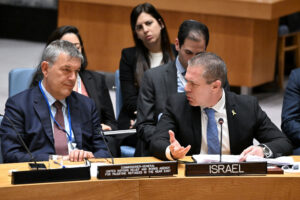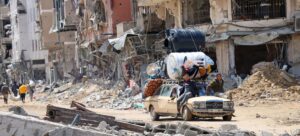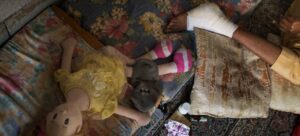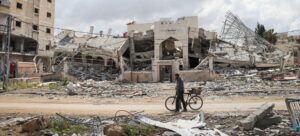UNRWA is the “backbone” of the aid effort in support of over two million Gazans displaced and battered by war with more than 33,000 killed – mostly women and children – and over 76,000 injured said UNRWA chief Philippe Lazzarini.
UNRWA briefing HIGHLIGHTS
- The agency is a ‘stabilizing force’, providing the backbone of the entire aid operation in Gaza
- A man-made famine is tightening its grip but UNRWA is being denied permission to delivery enough life-saving aid
- UNRWA is facing an Israeli campaign ‘to push it out of the Occupied Palestinian Territory’
- 178 UNRWA workers have been killed and 160 premises destroyed or damaged – killing more than 400 Gazans
- Mr. Lazzarini demanded an independent investigation into the blatant disregard for protection of humanitarian workers during the conflict
- UNRWA is ‘firmly committed’ to implementing any recommendations to strengthen neutrality safeguards
- Dismantling UNRWA would have “lasting repercussions” and will condemn “an entire generation to despair”
- Palestinians and Israelis share a long history of grief and loss. We must recognize “that they are equally deserving of a peaceful and secure future”
For summaries of this and other key UN meetings, visit our colleagues at the UN Meetings Coverage in English and French
5:23 PM
UNRWA must not be broken: Jordan
Ayman Safadi, Deputy Prime Minister and Minister of Foreign Affairs of Jordan said Israel wanted to break UNRWA, the backbone of humanitarian efforts in Gaza, urging Member States not to allow this.
UNRWA deserves your support because only UNRWA has the ability to meaningfully help Palestinians in Gaza, who are starving, and provide vital services to Palestinian refugees across the region.
The disinformation campaign the Israeli government has been spreading against UNRWA must not shape the world’s view of the agency, he said.
UNRWA has nothing to hide and it has faced up to its responsibilities, committing to fix any wrongdoings or shortfalls – should any be found.
He said Israel’s “witch hunt” had started long before allegations were made against a dozen staffers.
The purpose of the attack on UNRWA is to destroy the rights of Palestinian refugees but it will not succeed, he told ambassadors.
UNRWA must be protected now, in the same way it has been protected in the past.
4:55 PM
‘The time has come to defund UNRWA’: Israel
Israel’s Ambassador Gilad Erdan said UNRWA was “one of the weapons” crafted by the General Assembly which was only prolonging the Middle East conflict.
“UNRWA, the organization that so many of you [UN members] fund, is the UN’s single biggest obstacle to a solution,” he said, stressing that the agency “is creating a sea of Palestinian refugees, millions of them, indoctrinated to believe that Israel belongs to them”.
“The end goal is to use these so-called refuges and their libelous right of return – a right that doesn’t exist – to flood Israel and destroy the Jewish State,” he added.
Ambassador Erdan said that just because “UNRWA has a thin layer of Europeans in charge of collecting donations and garnering support, it does not change the fact that UNRWA is a Palestinian organization fully committed to the Jewish State’s destruction.”
Which other group of refugees, he asked, has a UN body dedicated to them, while there are millions of other refugees in other crisis zones aided only by UNHCR – the UN refugee agency.
“UNRWA is the world’s biggest advocate for a ‘one-State solution’, a Palestinian State from the river to the sea,” he said.
“There are alternatives to UNRWA, among them NGOs and other UN agencies,” said the Israeli Ambassador.
“Israel cannot and will not allow UNRWA to continue in Gaza as it did in the past, I repeat there are alternatives to UNRWA, and it is up to you [UN members] if they can succeed…the time has come to defund UNRWA,” he concluded.
4:48 PM
Palestine: Ground invasion and airstrikes must end
Ziad Abu Amr, Special Representative of the President of Palestine, expressed his appreciation for UNRWA and all other humanitarians providing critical relief.
“We salute your courage and your dedication as you carry out this noble humanitarian mission, risking your own lives to provide relief for our people,” he said, while offering his condolences to those killed performing their duties.
Mr. Ziad said lives cannot be saved or relief provided in Gaza as long as Israel continues its ground invasion and air strikes.
He call for international pressure to increase on Israel to ensure respect for international law, including international humanitarian law.
Stating that “massacres” against innocent people in Gaza have been ongoing for six months, he asked: is it not “high time for this killing, this destruction and displacement to stop?”
He recalled the General Assembly resolution that established UNRWA and gave it its mandate:
“This is when the question of the Palestinian refugees is solved. Based on that, the General Assembly renews UNRWA’s mandate periodically – despite every attempt and campaign to cut if off from the United Nations,” he said.
Mr. Ziad added that the agency is “not a mere humanitarian project”, stressing that it is a “historic witness” of the commitment and obligation by the international community regarding Palestinian refugees forced from their homes after the 1948 Nakba.
Children walk through partially destroyed streets in Jenin in the West Bank.
4:26 PM
UNRWA must reform to ensure neutrality: France
Representative of France Nathalie Broadhurst said her country would pay its annual contribution for 2024, to allow UNRWA’s humanitarian operations to continue.
She said all crossing points must be opened up so that the UN can deliver aid at scale, including to the north.
The agency plays “an indispensable” and important role for refugees and host countries while advocating for a just, equitable, realistic, and lasting solution to the Israeli-Palestinian conflict.
However, 75 years after its creation, UNRWA must be reformed and ensure absolute respect for the principle of neutrality, she continued.
The allegations that some UNRWA employees participated in the October 7 terrorist attacks against Israel are extremely serious.
France took note took note of the interim report of the independent external audit led by a former French foreign minister, whose final conclusions will be made public in a matter of days.
France will be extremely vigilant regarding the full implementation of the report’s recommendations to ensure UNRWA fully respects the “humanitarian principles of independence, neutrality and impartiality” which it must operate under.
Hostages being held must be released without delay and a ceasefire implemented, ahead of a two-State solution. The Palestinian Authority has a key role to play and she urged members to support the French draft resolution currently under discussion.
4:20 PM
Israel must end smear campaign against UNRWA: China
China’s Deputy Ambassador Geng Shuang said UNRWA was indispensable for the humanitarian efforts in Palestine, and cannot be replaced.
He urged Israel to stop interfering with UNRWA’s work. China supports an independent investigation on the allegations against certain members of UNRWA’s staff, but the results should not be predetermined, he said.
China also rejects vicious attacks on the agency in the absence of any solid evidence and called on Israel to end its smear campaign.
He reiterated China’s call for an immediate ceasefire because providing aid while bombardment continues is simply an impossible task.
He called on the US to remain impartial, urging the international community to take measures which would force Israel to respect Security Council resolutions.
Mr. Shuang said the Council was due to vote on Palestine’s full UN membership bid within days and China is hopeful they will prevail.
4:17 PM
UNRWA critical to aid effort in Gaza: UK
UK Ambassador Barbara Woodward recalled the mandate assigned to UNRWA some 75 years ago saying it remains “as important as ever”.
She said UNRWA’s work was “critical” to aid delivery in the Gaza Strip, calling on Israel to allow the agency and other humanitarian entities “unhindered access” in the enclave, particularly in the north.
“UNRWA is the main provider of humanitarian relief within Gaza and other UN and humanitarian actors depend on UNRWA’s distribution network to get aid to those in need,” she said.
Ambassador Woodward further recognized the agency’s role in providing health and education services, providing humanitarian support across the Middle East region, stressing its importance to regional stability, especially during the current crisis.
She said the UK was appalled by allegations that some UNRWA staff were involved in the 7 October attacks on Israel, noting the ongoing investigations.
“We also emphasize the importance of UNRWA continuing robust management reform, including stronger independent oversight and better detection systems, and we look forward to seeing the findings and recommendations of former French Foreign Minister [Catherine] Colonna’s independent review into UNRWA neutrality processes and systems,” she added.
“As our Prime Minister said this week, we will clarify the UK’s position on funding once we have reviewed these,” she said.
3:59 PM
US: ‘Deeply concerned’ Israel has not done enough to protect lives
US Ambassador Robert Wood, Deputy Permanent Representative, said the conflict has been one of the worst in recent memory in terms of the number of aid workers killed.
“These incidents are unacceptable, humanitarian workers must be protected,” he stressed, adding that the US is “deeply concerned Israel has not done enough to protect humanitarian aid workers or civilians.”
He recalled the draft resolution introduced by the US at the Security Council last month and reiterated the call for protection of humanitarians.
“As President [Joe] Biden conveyed to Israeli Prime Minister [Benjamin] Netanyahu on 4 April, that Israel must ‘implement a series of specific, concrete and measurable steps to address civilian harm, humanitarian suffering and the safety of aid workers’,” he said.
“US policy with respect to Gaza will be determined by Israel’s immediate and sustained actions on these steps,” he added.
Ambassador Wood further noted that the US paused additional funding to UNRWA over allegations that its personnel were involved in the 7 October attacks, and that the US Congress has since prohibited additional contributions until at least March 2025.
“We urge UNRWA and the wider UN system to take all steps necessary to strengthen the neutrality of the organization and improve UNRWA’s sustainability,” he said, while recognizing UNRWA’s “indispensable role” in distributing aid and maintaining continuity of care in Gaza.
“We urge UNRWA’s continued humanitarian access in Gaza and the lifting of onerous restrictions on its work,” he added.
3:48 PM
UNRWA’s role is indispensable: Russia
Russia’s Ambassador Vassily Nebenzia said his country had repeatedly warned that in the absence of a full-fledged, sustainable ceasefire, “all of our humanitarian efforts are doomed.”
No amount of voluntary deconfliction will help if one of the sides is determined to continue hostilities, especially when signals are received from one Security Council member, the United States, that Council resolutions do not have binding force.
The last resolution 2728 calling for a ceasefire during Ramadan, is clearly not enough, he added.
In these circumstances, the role of UNRWA is irreplaceable. If UNRWA cannot function, we will have “yet another illegal and immoral tool” for the collective punishment of millions of Palestinians “in dire need of aid.”
He condemned attempts to discredit the agency, calling for the restoration of all funding, even before the investigations are concluded. Russia will continue providing comprehensive assistance he added, as UNRWA’s work is not humanitarian, but also has an important stabilizing effect on the entire Middle East region.
3:26 PM
UNRWA: ‘Indispensible lifeline’ says Malta
Speaking in his national capacity Foreign Minister of Malta, Ian Borg said UNRWA was “an indispensable lifeline for Palestine refugees” in Gaza, the West Bank and elsewhere in the region, as well as a “stabilizing force”
“Preserving the lifesaving role and operations of UNRWA must be our primary objective,” he stressed.
He also voiced deep concern over the continued hostilities and the harrowing humanitarian conditions in the Gaza Strip, and ongoing attacks against humanitarian and medical personnel.
“We are witnessing an entire population being brought to the brink of conflict-induced starvation, with credible reports that famine has already taken hold in the north [Gaza].”
Foreign Minister Borg welcomed the UN’s swift response in the establishment two investigations into the “deeply concerning” allegations of involvement of UNRWA staff in the 7 October terror attacks.
He also welcomed the independent review into UNRWA’s neutrality, noting that the interim report indicated “UNRWA has in place a significant number of mechanisms and procedures to ensure compliance with humanitarian principal of neutrality.”
“We now look forward to outcome of both inquiries…and call on all parties to fully cooperate with these inquiries,” he said, urging donors to resume “desperately needed funding.”
3:32 PM
UNRWA is a pillar of Palestine: Algeria
Ahmed Attaf, Minister for foreign affairs of Algeria, said UNRWA was the last glimpse of hope for the Palestinian people. It embodies the ideals and the values on which this Organization is built.
UNRWA is the best and most authentic witness to the modern “Nakba” – referencing the mass expulsion of Palestinians by Israel in 1948 – and it has been targeted in a shameful way and on a fallacious pretext to ensure its destruction.
It reflects the plight of Palestinian refugees and their right to go back to their homeland. UNRWA is a pillar of Palestine, he said.
The international community must protect it, facilitate its vital activities, and stop any Israeli attempt to transfer its work to other humanitarian agencies.
He called on all countries to resume funding for UNRWA
Algeria calls all countries to resume their financial contributions to UNRWA and said his country would make an exceptional contribution of $15 million, on top of other national contributions.
The Palestinian cause is indivisible, and we are convinced that Israel cannot be allowed to act in defiance of the entire international community, he said. The two-state solution cannot be held hostage by what he called Israeli manipulation.
A UN staff member surveys the widespread destruction in Khan Younis.
3:15 PM
‘Insidious campaign’ to end UNRWA aid operation in Gaza: Lazzarini
UNRWA is the backbone of the aid effort to stop Gaza slipping into famine, Mr. Lazzarini told ambassadors, and beyond that it has championed Palestinian development for decades.
“Today an insidious campaign to end UNRWA’s operations is underway, with serious implications for international peace and security”, he said.
Now it faces an existential threat as relentless bombing and “a merciless siege have transformed Gaza beyond recognition.”
Children have begun to die of malnutrition and dehydration, he said, while food and clean water are just across the border.
Stopped from saving lives
“But UNRWA is denied permission to deliver this aid and save lives. This outrage is occurring despite consecutive orders by the International Court of Justice (ICJ) to increase the flow of aid into Gaza – which can be done if there is the political will”, he added.
Security Council members “have the power to make a difference”, he declared, with an overwhelming majority of Member States backing UNRWA.
UNRWA Commissioner-General Philippe Lazzarini addresses the UN Security Council meeting on the situation in the Middle East, including the Palestinian question.
The Israeli Government “seeks to end” the agency and requests to deliver aid to the stricken north are being repeatedly denied.
Mr. Lazzarini noted the challenges UNRWA has been facing since the war started, including attacks on its premises and staff, killing 178 personnel and damaging or destroying over 160 premises.
Demand for independent investigation
He said their premises have been used for military purposes, by Israeli forces, Hamas and other Palestinian armed groups, and its headquarters occupied militarily.
UNRWA personnel detained by Israeli security forces have shared “harrowing accounts” of mistreatment and torture in detention.
“We demand an independent investigation and accountability for the blatant disregard for the protected status of humanitarian workers, operations, and facilities under international law,” he stressed.
“To do otherwise would set a dangerous precedent and compromise humanitarian work around the world.”
The UNRWA chief addressed the allegations against individual agency personnel of involvement in the 7 October attacks: “Horrified by the allegations, I immediately terminated the appointments of those concerned,” he said, noting the investigation ordered by the Secretary-General as well as the independent review on how UNRWA upholds its neutrality.
He added that despite the prompt and decisive actions, a significant amount of donor funding remains suspended, with serious operational implications.
Committed to review findings
“Be assured that we remain firmly committed to implementing the recommendations of the review and to strengthening existing safeguards against neutrality breaches,” Mr. Lazzarini said.
He also warned that dismantling UNRWA will have “lasting repercussions”.
“It will make nearly impossible the formidable task of bringing half a million deeply distressed girls and boys back to learning,” he said, stressing that “failing to deliver on education will condemn an entire generation to despair – fueling anger, resentment, and endless cycles of violence.
“A political solution cannot succeed in such a scenario.”
“I urge you to commit to a genuine political process culminating in a solution that can bring peace to Palestinians and Israelis,” he told ambassadors, calling for an acknowledgement that a political process alone will not guarantee a sustainable peace.
“We must recognize – and reflect in our words and actions – that Palestinians and Israelis share a long and profound experience of grief and loss. That they are equally deserving of a peaceful and secure future.”
3:10 PM
The meeting is just getting underway with the Foreign Minister of Malta Ian Borg presiding, since his country holds the presidency for the month.
Members stood for a minute of silence in memory of all those humanitarian workers killed in the line of duty.
1:40 PM – Philippe Lazzarini has said the agency is facing a “deliberate and concerted campaign” to undermine its operations at a time when it’s crucial services – delivered by over 12,000 mostly local staff in Gaza – are most needed.
So far, some 178 UNRWA officials working in Gaza have been killed since Israel’s bombardment and military campaign began last October.
In January, the Israeli Government presented the UN with information accusing 12 UNRWA employees of taking part in the 7 October terror attacks but has yet to provide that evidence to the organisation. UNRWA nevertheless terminated their employment and began an internal investigation.
The UN chief also set up an independent review overseen by a former French foreign minister Catherine Colonna, which is due to report at the end of this week.
Funding crisis
Some 16 countries led by the United States announced a funding freeze for UNRWA – or suspension of future funding – in response to the allegations of collusion but some of those countries have since reversed course and resumed funding.
Mr. Lazzarini wrote to the General Assembly, which provides UNRWA its mandate, and later briefed Member States in March, saying the agency was at “breaking point” across the region and under serious threat of grinding to a halt.
Israel’s announcement in late March that they would no longer approve any UNRWA food convoys into northern Gaza meant that the clock is ticking “faster towards famine”, he said on X, formerly Twitter.
Diplomacy continues in New York
Ambassadors last met on the humanitarian crisis in Gaza on 5 April when they heard top UN aid officials make an appeal for the Security Council to help end the carnage there six months on from the start of the conflict.
The Maltese mission which holds the presidency for the month of April said in a post on X, that there will be a vote on a draft resolution put forward by Algeria this coming Friday.
The draft is focused on the diplomatic push by some countries to admit Palestine as a full Member State of the UN, in the wake of the crisis in the Middle East.
Although a special committee on UN membership did not come up with a conclusive recommendation this week, the Algeria draft recommends to the General Assembly that the State of Palestine “be admitted to membership in the United Nations.”
Here’s a reminder of the HIGHLIGHTS from the Council meeting on 25 March which passed a resolution demanding an immediate ceasefire during Ramadan:
- The UN Security Council adopts a resolution tabled by its 10 non-permanent members (E-10) demanding a ceasefire in Gaza during Ramadan, by a vote of 14 in favour to none against, with one abstention (United States)
- Resolution 2728 also calls for the immediate release of hostages and for ensuring humanitarian access to Gaza
- The Council rejected a Russia-proposed amendment that would have called for a permanent ceasefire
- The US ambassador said her delegation “fully supports” the critical objectives of the draft
- Algeria’s ambassador says the ceasefire will end “the bloodbath”
- “This must be a turning point,” says the ambassador for the observer State of Palestine
- The draft’s lack of condemnation of Hamas is “a disgrace”, says Israel’s ambassador
For summaries of UN meetings, visit our colleagues at the UN Meetings Coverage in English and French






